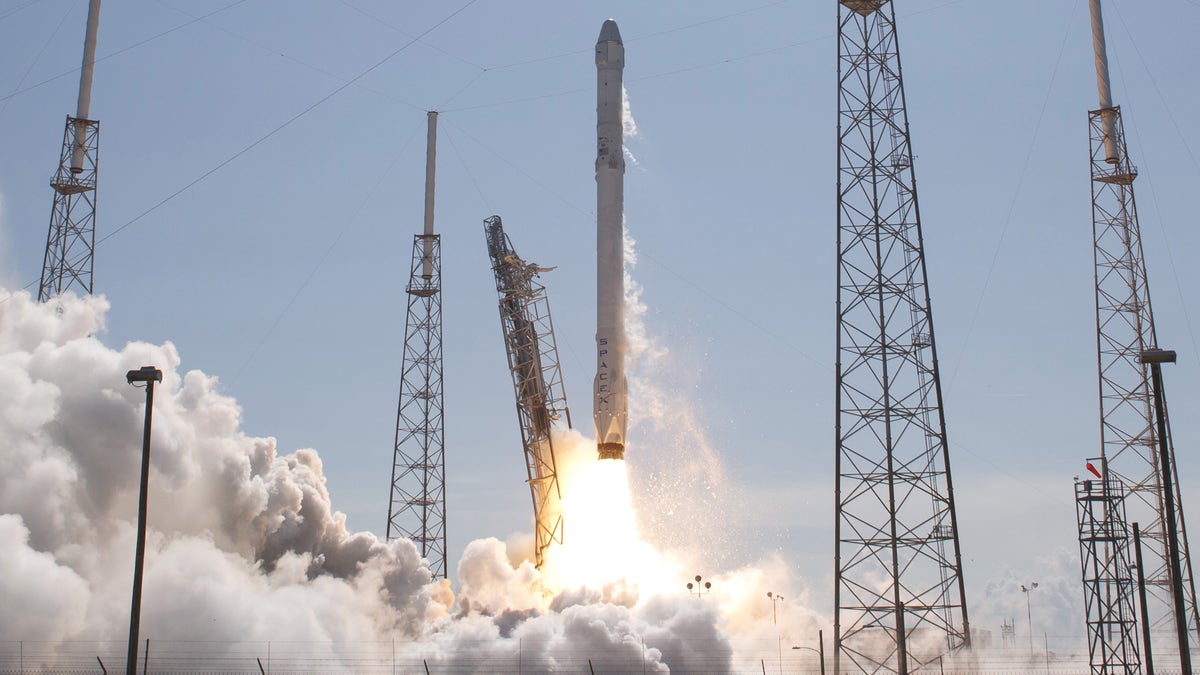
The unmanned SpaceX Falcon 9 rocket with Dragon lifts off from launch pad 40 at the Cape Canaveral Air Force Station in Cape Canaveral, Florida April 14, 2015. (REUTERS/Scott Audette)
After successfully launching a two-stage Falcon 9 rocket with an unmanned Dragon spacecraft on board from Cape Canaveral, to the International Space Station on Tuesday, SpaceX attempted to land the rocket’s first stage on a floating barge 200 miles off the Florida coast.
For the third time this year things didn’t go as planned, and, as SpaceX founder Elon Musk later tweeted, the rocket “landed fine, but excess lateral velocity caused it to tip over post landing.” Video of the failed landing, which concludes with an epic explosion, has been making the media rounds.
This is the latest hurdle in an ongoing attempt by the company to land and recover a rocket. Most rocket boosters either burn up in the atmosphere or – as NASA’s do – simply fall into the ocean. With cheaper spaceflight the ultimate goal, SpaceX is the first space organization to attempt a rocket landing on a floating base, or, as the company calls it, an “autonomous spaceport drone ship.” Still, it begs the question- why attempt the landing at sea?
According to American Institute of Aeronautics and Astronautics Aerospace Engineer Paul Huter, it’s simply a matter of convenience. “The rocket is launching out over the Atlantic ocean, so the easiest place to land it would be straight out into the ocean. Now, obviously, this presents challenges when compared to landing [a rocket] on solid ground as something at sea is constantly moving around. But in terms of energy required (most of which has already been used during the launch), it is more efficient to try and land on something in the ocean.”
As for whether or not the deep-pocketed space organization can successfully land the rocket, some experts are dubious. Even before the latest landing attempt, Musk himself was giving it a 50/50 chance to succeed. Huter believes SpaceX can pull it off, but it won’t be anytime in the near future. “I think SpaceX has the capability and the know-how to land on the floating barge, but there are a lot of variables that need to be taken into consideration, which make it a difficult task,” he told FoxNews.com. “With unlimited time and money, they could pull it off and revolutionize space launch technology. But they only have so many launches, and each failure costs them money.”
SpaceX may try for an ocean landing again as early as June, when the next Dragon shipment is scheduled for launch.
The company eventually hopes to have rockets land themselves back on solid ground after launch, which would revolutionize the space industry. Huter noted that this could be similar to what it has accomplished with its Grasshopper rocket, a 10-story “Vertical Takeoff Vertical Landing” vehicle which has made some successful low altitude, low velocity runs. He pointed out, “however, landing something that was moving at thousands of miles an hour pretty much straight up is a far cry from what Grasshopper does with its small ‘jumps’ into the air. But if SpaceX can utilize the Grasshopper technology and overcome the energy issue of getting back to land for a landing on the ground, I think they have a real shot at pulling this off.”
